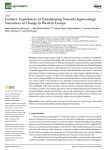Markiewicz-Keszycka M., Macken-Walsh A., Carter A., Mooney S., Devereux E.J., Henchion M., Hynds P. (2025). Farmers’ experiences of transitioning towards agroecology: narratives of change in Western Europe. Agriculture, 02/03/2025, vol. 15, n. 6, p. 625.
https://doi.org/10.3390/agriculture15060625
https://doi.org/10.3390/agriculture15060625
| Titre : | Farmers’ experiences of transitioning towards agroecology: narratives of change in Western Europe (2025) |
| Auteurs : | M. Markiewicz-Keszycka ; A. Macken-Walsh ; A. Carter ; S. Mooney ; E.J. Devereux ; M. Henchion ; P. Hynds |
| Type de document : | Article |
| Dans : | Agriculture (vol. 15, n. 6, March 2025) |
| Article en page(s) : | p. 625 |
| Langues : | Anglais |
| Langues du résumé : | Anglais |
| Catégories : |
Catégories principales 06 - AGRICULTURE. FORÊTS. PÊCHES ; 6.4 - Production Agricole. Système de ProductionThésaurus IAMM SYSTEME DE PRODUCTION ; AGROECOLOGIE ; TRANSITION AGROECOLOGIQUE ; AGRICULTEUR ; COMPORTEMENT DES AGRICULTEURS ; EUROPE OCCIDENTALE |
| Résumé : | Transitioning to agroecology on dairy and beef farms is touted as a sustainable response to environmental externalities. The current study conducted narrative interviews with farmers who transitioned towards agroecological food production by implementing pro-environmental diversification measures in the Republic of Ireland, the United Kingdom and France. The study aimed to determine farmers' experiences of agroecology and used a thematic approach for the analysis. Results indicate that the motivations, values and principles of farmers transitioning to agroecology are closely aligned with the ideology of the new/peasantry. Farmers' decisions were primarily influenced by ecological principles and a sense of responsibility towards environmental protection, with particular biographical events central to the transition to an alternative food production system based on agroecology. Other explanatory factors related to farmers' desires to increase the autonomy and profitability of the farm, and their conscious efforts to eliminate dependence on external inputs. Farmers who entered agriculture with no family background in farming had acquired skillsets which provided them with specific advantages in advancing towards agroecological goals. This paper provides insights relevant to policymakers, extension and education providers on how to practically support agroecological transition. |
| Cote : | En ligne |
| URL / DOI : | https://doi.org/10.3390/agriculture15060625 |







